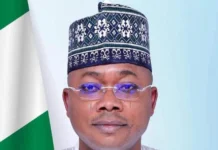ECOWAS said that it spent more than 101.73 million dollars from May 2012 to Nov. 2017 on its mission in Guinea Bissau.
President of the ECOWAS Commission Marcel de Souza said this at the 52nd Ordinary Session of the Authority of Heads of State and Government in Abuja on Saturday.
De Souza said that about 84 million dollars of the amount was borne by the commission while ECOWAS’ arrears to troop contributing member states was around 45 million dollars.
The commission’s president said the mission in that country had taken its toll on the finances of the sub-regional bloc.
He added that the fight against terrorism and the management of internal political crises in member states took precedence over economic and social development, poverty eradication and youth employment.
“A major part of national budgets of member countries as well as the commission’s operational budget is being diverted to combat terrorism and carry out peacekeeping operations.
“ECOWAS has continued to assist Guinea Bissau to ensure the return of peace and order in the institutions by keeping ECOMIB in the area until 31 Dec. 2017 and the dispatch of the several ministerial missions to assess the implementation of the Conakry and Bissau Agreements.
“It is deplorable that to this day, after several years of institutional crisis, the political situation in Guinea Bissau has not really changed and this remains a major challenge for our regional economic community.
“The speedy resolution of the political crisis in Guinea Bissau would make it possible to use all these resources for socio-economic development projects needed by the people of the sub-region.”
De Souza further said that mission in The Gambia was operating without major obstacles but required constant mobilisation of “significant financial resources which puts very heavy financial pressure on the commission”.
He added that it was necessary to enhance synergy in the coordination of all ECOWAS forces operating within the sub-region.
He further stressed that a politically calm and secure sub-region would promote the vision for and economically prosperous ECOWAS.
On the monetary integration of the ECOWAS, De Souza said that the positive economic growth trend in member states would facilitate the establishment of a Customs Union by the end of 2017.
“With Nigeria’s emergence from recession this year, the ECOWAS region is expected to grow by an average of 2.2 per cent.
“Countries that faced decline in 2016 recovered in 2017 and we hope they will do even better in 2018 with growth rates of up to 2.6 per cent.”
The African Union Commission Chairperson, Moussa Faki Mahamat, commended ECOWAS for efforts made to promote peace and security in the sub-region.
Mahamat, however, called on member states to intensify efforts to ensure that the continent was rid of the menace of conflicts by 2020.
“Terrorism continues to bereave many parts of the continent.
“The images that emanate from Libya, the inhuman and degrading practices, pose the issue of migration; we are deeply challenged to work urgently with our partners to find immediate solutions to cyclical events.
On trade, the AU chair said that intra-African trade remained “at a very low level” in spite of efforts made to encourage integration.
He said that the establishment of a Continental Free Trade Area would speed up continental integration in line with the Agenda 2063.
“It is expected that the African Union Champion for the Free Trade Area, President Mahamadou Issoufou, propose to his colleagues the organisation of an extraordinary summit in March 2018 to adopt the agreement establishing the Free Trade Area.”
The News Agency of Nigeria (NAN) reports that the Authority of ECOWAS Heads of State and Government was expected to discuss Morocco’s membership of the bloc and the security situation in Guinea Bissau.
However, no mention of Morocco’s admission to the Sub-regional bloc was made by any of the leaders in their presentations. (NAN)



